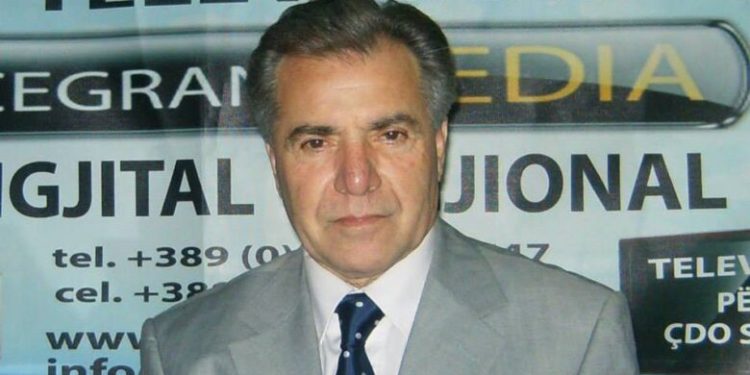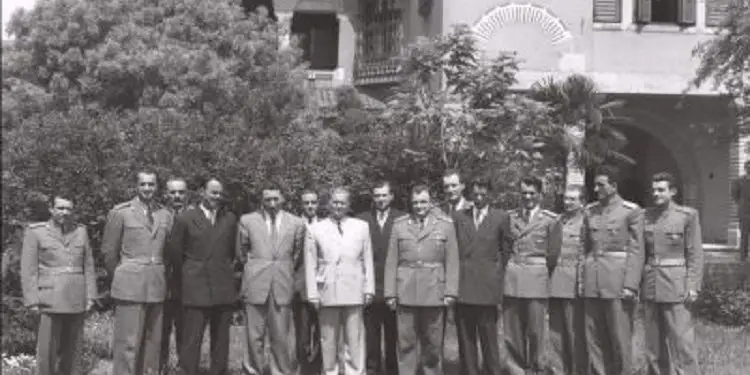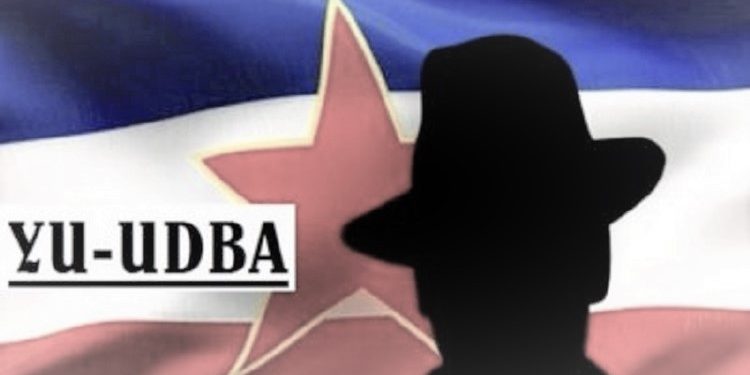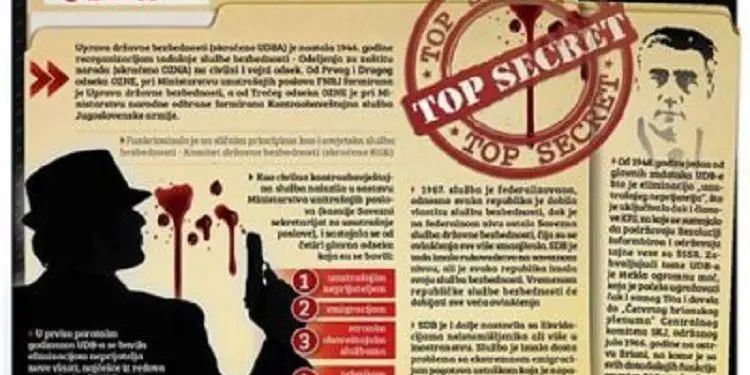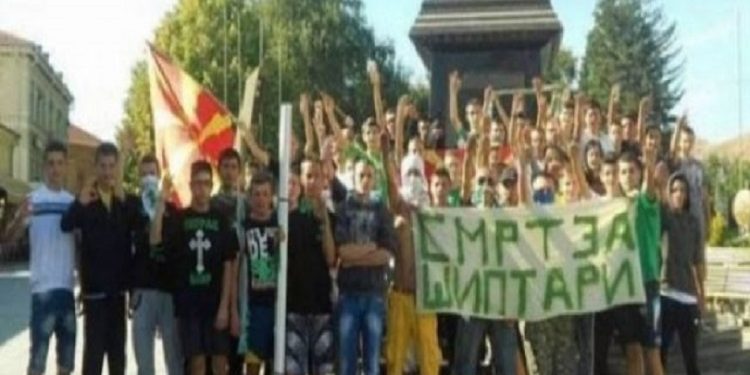By Nafi ÇEGRANI
Memorie.al / In the dark basement of a Skopje building, where Nafi Çegrani was staying, the militia found a bundle of “armaments” and a thick, handwritten diary wrapped in a plastic bag. On those pages, held by the restless hands of time, a part of his truth might have been hidden. Perhaps there, amidst the lines filled with pain and thoughts, the accused had confessed what could not be said aloud—the truth about himself.
The Stolen Diary – The Hidden Truth
In the heavy summer of 1981, when the shadow of the police and UDB loomed over the Albanians, an act took place in Skopje that today sounds like a scene from a dark historical drama: the theft of my personal diary. In the basement of the building where I lived, the Yugoslav militia, led by the secret services, put their hands in a plastic bag containing some notes, which they called “zbrojevka” – weapons – and next to them, a thick, handwritten diary.
This diary was neither “proof” nor “a danger to the state.” It was only my inner voice, my memory, my pain, the questions and answers that could not be expressed aloud in a deaf society. It was the space where a person wrote with the belief that at least paper does not betray. But even paper, seized by the hands of the police, became “guilt.” The Belgrade magazine ‘Ilustrovana Politika’ in 1981, published this event as a small propagandistic sensation: “Perhaps the accused on those pages confessed a part of the truth about him”?!
That’s what it wrote. But what truth? My intimate truth, which they called dangerous. The truth of a man who wanted to preserve his dignity and identity, who believed that writing, is a defense against oblivion. The theft of my diary was more than a police act. It was an attempt to extinguish memory, to control even a person’s dreams. But no apparatus, no secret service, can imprison the written word, in the end.
Because it survives as a testimony. Today, when I remember that moment, I see my stolen diary as a symbol: a symbol of stolen memories, but also of a truth that cannot be hidden. That diary was my first trial with history – and history, no matter how much they tried to silence it, is telling the truth, including the context of 1981, the raids, the arrests, and the Yugoslav propaganda.
Shedding light on the political context of 1981, the raids, the arrests, the propaganda of the Yugoslav regime, and the way the theft of my diary was used as “proof,” for what, for what? …The year 1981 remains a turning point in the history of Albanians in Yugoslavia. The student protests in Kosovo spread like lightning in an open sky, demanding freedom, equality, and national rights. The government reacted with violence, establishing a silent state of emergency: mass arrests, raids, fabricated trials.
It was in this atmosphere that the raid took place in Skopje, in the apartment where I live. The police and UDB organs, guided by the logic of political paranoia, discovered a plastic bag in the basement containing some notes that were called “zbrojevka” – as if they were weapons. In addition, they confiscated my personal diary, a thick, handwritten book.
The Belgrade magazine ‘Ilustrovana Politika’ presented the event with the ironic title: “Istina možda u dnevniku” – “The truth is perhaps in the diary.” According to it, perhaps the accused had confessed a part of the truth about him there. It was a way to create the image of an “admitted guilt,” to fill the void of fabricated accusations.
In fact, the diary was neither “proof” nor “danger,” because I know what I wrote in it, I know its content from the past years, from my moments, impressions, and thoughts which I put in the diary lines, intertwined with my thoughts and attitudes, not leaving aside even the ideological and political ones of the time.
It was simply an intimate testimony, a memory sheet where I wrote about my spiritual world, about my experiences and the questions that I did not dare to say aloud or publicly out of fear I had from the Yugoslav agencies and especially from the UDB, as one of their former officials I was once, because I was aware of the danger I faced and their secret surveillance, in particular with my escape to the USA. They did not agree with my political views and attitudes as an Albanian, and they could easily raise this as a hostile act or action against me.
Thus, an internal note was turned into a “political crime.” A harmless manuscript was presented as a threat to the state order, as is happening with my confiscated Diary! …Diaries are always more than written pages. They are silent spaces where a person talks to himself, where the soul finds refuge from external violence. In them, a person confesses what cannot be said in public.
They stole my diary to turn it into “proof.” But, in reality, it was a mirror of the soul.
It was a shadow that spoke of the silent truths of the time. On each page, among the simple words, lived a man who sought to remain free, to preserve his dignity, to preserve his national memory. When I remember that moment today, I see it as a symbol: violent power not only imprisoned the body but also the mind; it not only forbade public speech but also secret writing. In their eyes, even a diary was a weapon.
But, in fact, the theft of the diary gave it another life. From a simple manuscript, it was turned into a metaphor for stolen memory, for hidden truth. Today, it is a testimony not only of my life but of the fate of a people that sought its freedom. In its pages, they may have seen confessions of pain, of hope, of love for my country, of a thirst for freedom. These things were “dangerous” for them. For me, they were simply human truths.
The raid and the secret propaganda of the UDB
…So, in 1981, after the outbreak of student protests in Kosovo, the Yugoslav state apparatus mobilized all mechanisms of control to extinguish any critical voice, any sign of disobedience, and any shred of spiritual freedom. The waves of repression did not stop only in Pristina, or in the cities of Kosovo, but also affected Skopje, Tetovo, Gostivar, Kërçova, Dibër, and the Albanian lands of Macedonia.
It was in this atmosphere that the raid on me was carried out. In the basement of my apartment, the police and UDB agents found a plastic bag. Inside it were some simple notes that they called “zbrojevka” – a word that meant “weapon” – and a thick manuscript: my personal diary.
The Belgrade magazine ‘Ilustrovana Politika’, in 1981, published a short piece that turned this event into a propaganda sensation: “U podrumu zgrade u Skoplju gde je stanovao Nafi Čegrani milicija je u jednoj plastičnoj kesi otkrila ‘zbrojevku’ i podeblji rukom pisani dnevnik. Možda je optuženi na tim listovima ispričao deo istine o sebi.” (In the basement of the building in Skopje where Nafi Čegrani lived, the militia discovered a ‘weapon’ and a thick handwritten diary in a plastic bag. Perhaps the accused on those pages confessed a part of the truth about him.)
This short text, published in a popular magazine, was actually part of a strategy: to discredit, to create the image of an “internal enemy” who self-confessed through his intimate writings. They turned my diary into “proof of guilt,” a proof that they did not understand and could never understands. Diaries are not political documents, but intimate testimonies. They are spaces where a person talks to himself, where he describes anxiety, dreams, hopes, the unsaid. They are literature of the soul and not armament.
They stole my diary to use it against me. In their eyes, every line that did not fit the ideology was a knife, every free thought was a bullet. The government could not stand the inner word, because even it, enclosed in pages of paper, had the power to call for freedom. They forgot a simple thing: that no police apparatus can extinguish the human spirit. They can confiscate the diary, they can hide it, but it remains a testimony. Its absence speaks as loudly as its presence.
…The method of stealing manuscripts was not accidental. The UDB and other Yugoslav services had a known practice: every note, every poem, every personal diary of Albanians was interpreted as “hostile propaganda” or “a call for nationalism and irredentism.” Many young Albanians in Kosovo and Macedonia were sentenced for writings in school notebooks, for poems that spoke of the flag, for memories that mentioned Albania.
In this logic, my personal diary was also turned into a “weapon.” The magazine ‘Ilustrovana Politika’, quoting the police, was not intended to inform, but to intimidate. It tried to tell the Yugoslav public opinion: “Look, even the personal writings of these people are a danger!” This was how the propaganda apparatus fed its narrative: Albanians were presented as a continuous threat, even when they were only writing about themselves.
For me, the stolen diary was not just a lost notebook. It was a mirror where I saw myself and my time. It was an internal memory that the regime sought to erase. But, in fact, the theft of the diary gave it another life. From a simple manuscript, it was turned into a metaphor for stolen memory, for hidden truth. Today, it is a testimony not only of my life but of the fate of a people that sought to survive. In its pages, they may have seen confessions of pain, of hope, of love for my country, of the thirst for freedom. These things were a “danger” for them. For me, they were simply human truths.
A diary that was not finished!
Today, when I remember the raid, I see my stolen diary as a symbol of a time when even a person’s silent words were translated into “weapons.” But the truth is this: that diary was not extinguished. It continues to live in my memory, in my words, in my books. Nothing can extinguish the word that comes from the depths of the soul. The UDB stole it, the fabricated courts used it as “proof,” the propaganda distorted it, but time brought it back as a testimony. Today, that stolen diary is a living indictment against injustice and an immortal page of my truth.
…I had started my diary a long time ago, not as a normal book of memories, but as a notebook of my thoughts and testimonies. In it, I wrote about my life before and after my escape to America, about my return and the confrontations I had with some of the darkest figures of the Yugoslav security apparatus. Its pages held concrete names:
Nikola Ilievski, head of sector II of the SDB, known for his chauvinistic arrogance; Kiro Koshtanov, director of General Affairs of the Secretariat for Internal Affairs of Macedonia; and even the structures of the military KOS of the Yugoslav People’s Army. I did not write only simple impressions, but also detailed analyses of their practices, the clashes I had, the methods of blackmail and pressure they used.
In those pages, I also included statistical aspects – the percentages of Albanians in Kosovo, Macedonia, Montenegro – that reflected the demographic reality of the region. This reality, denied and distorted by the regime, was unbearable for them. The diary also contained my impressions before and after Tito’s death, when the system began to shake at its foundations. So, the diary was not simply “intimate.”
It was a silent file, a small personal archive that I had started to build as an act of remembrance and as a narrative for Albanian history. The Yugoslav newspapers of the years 1981–1982 are full of examples of this line ‘Politika’ (April 1981): “Uhapšeno više od 600 lica zbog kontrarevolucionarnih aktivnosti u Prištini i drugim mestima na Kosovu” (More than 600 people arrested for counter-revolutionary activities in Pristina and other places in Kosovo).
Borba (May 1981): “Separatističke grupe u Tetovu i Gostivaru deluju po nalogu neprijateljske emigracije” (Separatist groups in Tetovo and Gostivar act on the orders of the enemy emigration). ‘Nova Makedonija’ (October 1981): “Kod određenih lica pronađeno je oružje, neprijateljska literatura i dnevnici sa irredentističkim sadržajem” (Certain people were found to have weapons, hostile literature, and diaries with irredentist content). These writings confirm the model: any free intellectual expression, any private document that challenged the official narrative, was turned into “proof” against Albanians.
The diary stolen from the basement of Skopje is not just a personal memory. It is a testimony to the violence of the UDB structures against Albanian intellectuals, a testimony of a time when even a word written in a private notebook was considered a threat to the state. Today, even though that diary is physically missing, its narrative continues to live in your memory and in the truth that comes to light.
My story is just one of hundreds that are waiting to be documented. Because forgotten injustice is not extinguished – it returns, it is repeated; it becomes a new wound on the body of the nation. Dignity is not measured by blackmailed judges, or by fabricated verdicts in the dark offices of the UDB.
Dignity is measured by a person’s conscience and by the judgment of history. Even when legal justice fails, the testimony remains. It remains as a memory, as a tombstone over falsehood, as a warning for the generations to come and as an unquenchable call for true justice.
They took my diary, they stole it, they confiscated it, and perhaps they hid it in some drawer or safe so it would never see the light of day, or maybe they intentionally removed some of its pages, or maybe countless sheets written with my hand have been desecrated out of spite, but the spirit of that testimony that I keep so fresh in my head and in my living thoughts cannot be confiscated or erased. I will write and rewrite it again in my memoirs. Because every written word was not only a personal confession, but it was a part of the truth of a people that sought the path of the Sun and light, to live free in its centuries-old ethnic lands. / Memorie.al




